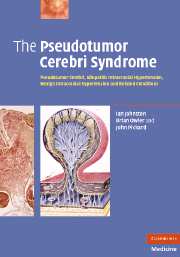 The Pseudotumor Cerebri Syndrome
The Pseudotumor Cerebri Syndrome Book contents
8 - Treatment
Published online by Cambridge University Press: 21 August 2009
Summary
Introduction
The treatment of PTCS is a somewhat complex matter although, in clinical terms, it might be described as relatively successful. In any analysis of the treatment of PTCS there are at least five aspects reflecting this complexity which need to be considered.
PTCS is a condition of quite variable natural history with cases ranging from those which resolve spontaneously or rapidly with either correction/withdrawal of an apparent causative factor, or with brief and simple treatment, to those cases that are chronic, progressive and refractory to treatment.
There are no methodologically satisfactory studies of the different treatment options. Thus, in a 2002 report reviewing ‘interventions for idiopathic intracranial hypertension’, Lueck and McIlwaine drew the following conclusion: ‘There is insufficient information to generate an evidence-based management strategy for IIH. Of the various treatments available, there is inadequate information regarding which are truly beneficial and which are potentially harmful. Properly designed and executed trials are needed.’
The majority of treatments used over the past 100 years have all been successful, at least to a significant degree, and in a significant number of cases. The historical development of treatment methods is considered in detail in Chapter 2, but in summary these are serial lumbar punctures, subtemporal decompression, steroids, diuretics, acetazolamide, CSF shunting, optic nerve sheath decompression and direct treatment of cranial venous outflow obstruction. All are still in use and the choice of which to use in a particular patient often comes down to the desire to avoid a particular complication, or the specialty of the treating doctor. All, however, have a significant failure rate or complication rate, or, indeed, both.
[…]
- Type
- Chapter
- Information
- The Pseudotumor Cerebri SyndromePseudotumor Cerebri, Idiopathic Intracranial Hypertension, Benign Intracranial Hypertension and Related Conditions, pp. 189 - 231Publisher: Cambridge University PressPrint publication year: 2007


